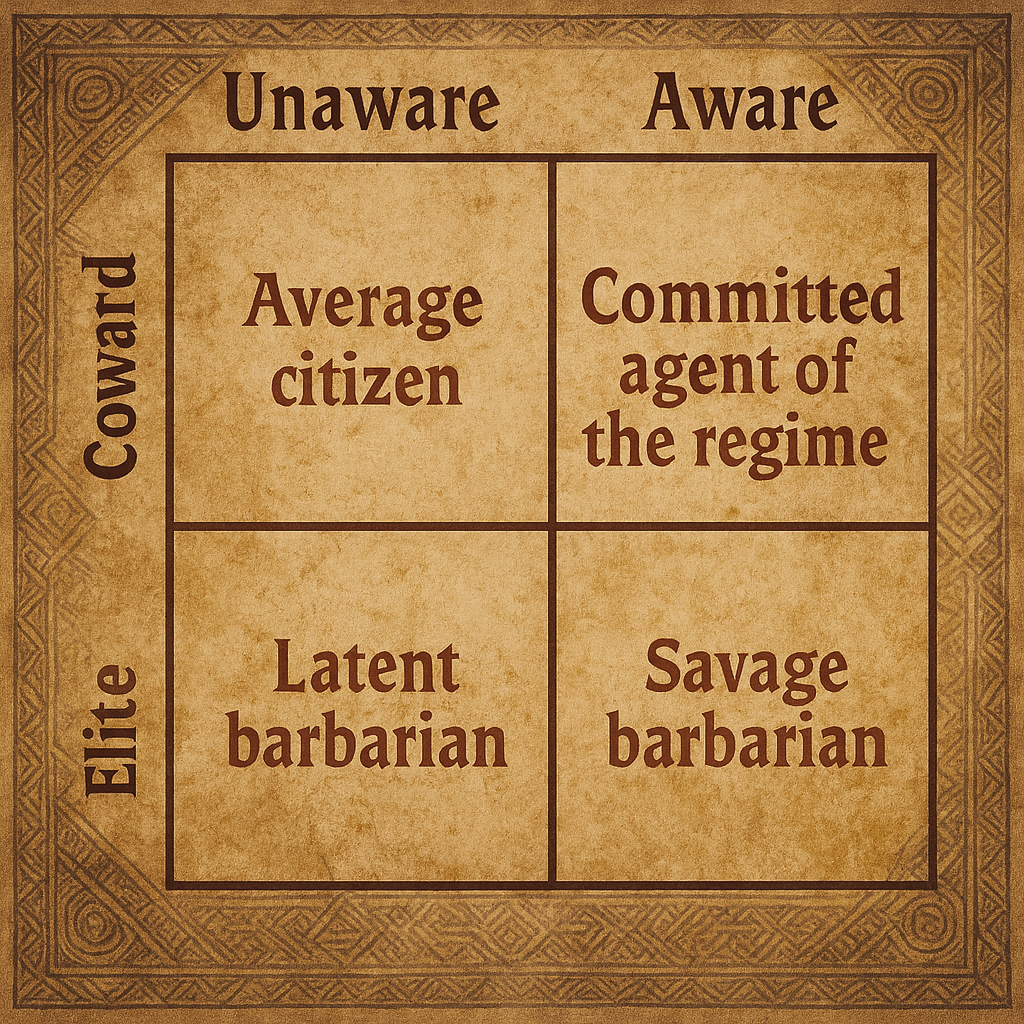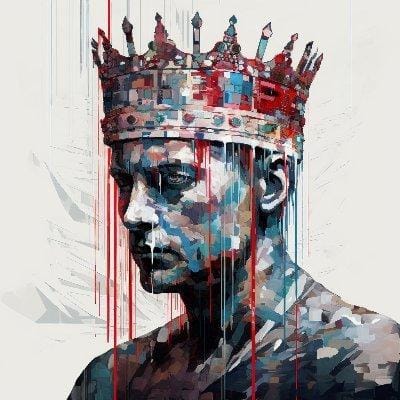Colonizing the Maze

By Colonial
Bentham’s 18th‑century “panopticon” described a prison where the inmate never knew when they were being watched. Michel Foucault later used that metaphor to explain how constant surveillance causes people to internalize authority – to police themselves. Today the idea has taken on a digital life. Cameras, sensors and software work together to watch us in ways Bentham never imagined. Governments and corporations build vast “techno‑panopticons” that harvest our location, conversations, purchases and relationships, then use that data to predict and shape our behaviour. Within those systems, society is bifurcating into two worlds: those who live fully beholden to the regime’s digital infrastructure and those who take control of it themselves.
When the feed shapes the mind
In the controlled world, citizens learn about the world through state‑aligned media and algorithmic feeds. Many governments are expanding their media empires across borders, competing to control the global narrative. Private outlets are also being captured. State‑produced news floods the airwaves and social feeds. This dynamic illustrates what Curtis Yarvin has called the “cathedral”: the diffuse but unified cultural, academic and media establishment that enforces consensus and marginalizes dissent. The cathedral is not a single ministry of propaganda but a decentralized network of institutions that reinforce each other’s narratives, shaping public thought so thoroughly that alternatives appear illegitimate or dangerous. This is not new. Every regime in history has tried to control popular narratives in order to control the populace. Plato even counseled rulers in his dialogue Laws on how to manage myths and stories to secure social order.
However, over the last 150 years, information technology has only bolstered centralized messaging. The finite nature of radio and television channels made them especially useful for centralized control, since only a handful of broadcasters could reach the public. This scarcity ensured that governments and their approved corporate partners could dominate the airwaves and shape a single, unified narrative. The early days of the internet, by contrast, seemed to offer a radical alternative: a decentralized space where dissident thinkers could speak directly to the world without gatekeepers. It promised a renaissance of free inquiry. Yet that promise is eroding. The same corporations and governments that nearly lost their grip on the narrative have learned how to reassert it online through algorithmic curation, centralized platforms, content moderation regimes and the concentration of digital infrastructure. The net that was supposed to liberate now increasingly resembles the old broadcast regime—only more efficient and more invasive.
Alongside overt propaganda, algorithms curate our reality. Social‑media companies optimize for engagement over truth while pushing the regime's narrative. Filtering algorithms reduce exposure to dissident content and reinforce confirmation bias in favor of the regime. AI bots are everywhere and no one has more resources to proliferate and control them than the state. When regime-controlled outlets flood the platforms and algorithms prioritize emotionally charged content tailored to your psyche, citizens’ understanding of history and current events becomes even more malleable – curated to serve those in power.
“He who controls the past controls the present. He who controls the present controls the future.” -Orwell
Surveillance everywhere: cameras, devices and money
To further maintain control, the regime constructs an all‑seeing infrastructure. Modern cities bristle with surveillance cameras. Estimates from 2021 claim there were already around one billion surveillance cameras globally – about 560 million in China and 85 million in the U.S., giving the two countries similar camera‑to‑citizen ratios. Governments use facial‑recognition cameras to profile and track citizens. But cameras are only part of the picture. The Internet of Things embed microphones and other sensors in refrigerators, thermostats and smart‑watches. These devices record an incredible array of data about who we are. From our heart rates to our eating habits. Such systems turn homes into listening posts.
Smartphones are tracking devices in citizens’ pockets. Mobile apps request location permissions and then sell precise location data to data brokers. The “location data broker industry” packages these detailed records of people’s movements and, when the data can't be bought in white markets, it gets stolen and sold in black markets.
Vehicles are tracked through automated license‑plate readers (ALPRs). These high‑speed cameras capture plates along with time and location. If a plate appears on a “hot list,” police receive alerts; otherwise, the data is stored. ALPRs collect millions of data points that can reconstruct a vehicle’s travel pattern with no U.S. federal law limiting collection. Many U.S. cities are already saturated with these systems which are funded by the very tax payers who are being spied on. Like slaves giving their masters the very power needed to keep them in line.
Finances are another window into our lives. Under the Bank Secrecy Act and Patriot Act, banks must record and report customer transactions. Existing financial surveillance already includes millions of “suspicious activity reports” and government programs tracking wire transfers (KYC bitcoin only entrenches this surveillance, giving bureaucrats immediate access to citizens’ financial behavior).
Social media is monitored too. Leaked documents from the Atlanta Police Department show how officers compiled 2,300 pages of intelligence on activists opposing a police training facility, tracking likes, shares and comments on social media posts and sharing the information across local and federal agencies. This “intelligence echo chamber” criminalizes dissent.
Data oceans, predictive policing and the regime’s objectives
What information about you does the regime want? Everything. 2020 reporting on China’s AI surveillance state described authorities’ goal to match footage from millions of cameras with an “ocean of personal data” (text messages, travel records, reading habits and purchases) to predict resistance. The same infrastructure gets used to score political loyalty. In Xinjiang, AI start‑ups sold tools that track and flag behaviors for state intelligence programs. The falling cost of digital storage encourages both companies and governments to retain data indefinitely. The regime uses this information to deter dissent, profile potential enemies, manipulate markets and control populations. The insight it gains into citizens' lives allows for incredible power to shape and sell narratives. Imagine engaging a car salesman who already knows everything about you. His ability to shape his pitch to suit your particular interests and frame of mind would be a near superpower.
Currently, no single government entity has access to all of the accumulated data from various sources. However, as data accumulates, highly developed AI systems like that employed by Palantir will make quick work of sorting through it and giving regime agents the precise tools to control mental models, infiltrate dissident networks, and ensure the slaves continue to prop up their masters.
Life outside the Matrix?
Not everyone accepts total surveillance. Elite citizens try to avoid the panopticon by limiting their digital footprints and avoiding unnecessary smart appliances. Cypherpunks are developing mesh networks that allow devices to share information over non-cellular frequencies and without using the state‑controlled internet. VPNs, secure browsers and Tor are invaluable tools; they encrypt traffic and hide IP addresses. No-KYC bitcoin and monero can be used to transact and save wealth without divulging anything to one's enemies. Open source AI models can be tweaked and employed to serve the user's ends rather than those of the regime.
For these budding aristocratic souls who manage to access information outside the regime’s control, the experience is liberating and disorienting. Uncaptured reporting and research exposes one to an entirely different perspective on history, providing context and facts which otherwise remain absent. Most of you have used the phrase "red-pilled" more than once to describe this experience. There are psychological costs too. Exposure to a world of conflicting narratives can result in cognitive dissonance. People who cross the divide may struggle to reconcile what they’ve been taught with what they’re learning. They may also become targets for disinformation campaigns; the same algorithms that fuel propaganda within the panopticon also propagate fringe "conspiracy theories" outside of it. Friends, family, co-workers, and bosses will not tolerate viewpoints from outside the scope.
But, the truth is out there. And when you find it, the breakthroughs in how you understand your world and yourself are absolutely priceless. You'll discover a path to start taking control. You'll discover how to prevent the loss of your wealth, your family, and your own mind to the regime which seeks to enslave. You cannot fully escape the panopticon—it covers too much ground, and its eyes are everywhere. But you can learn to live within it without being mastered by it, to carry yourself in ways that keep your will intact even under constant surveillance. Even to become master over it yourself.
The Barbaric Option
Upon discovering the manufactured narrative and fully captured democratic police state in which you live, you'll have a choice:
Despair. Try to hold on to as much of your wealth, values, friends and family as you can. Constantly battling to use technology to fend off the regime. Seeking whatever simple comforts one can find all the while whining about how "things shouldn't be like this".
OR
Seize the terrain. Learn to use the technology the regime is wielding against you NOT merely to turn it back against your oppressor, but to build your own dominion. Control narratives in ways that elevate you and yours. Raze the house of cards and build something glorious and lasting in its place. The early promise of the internet is still alive, but it demands courage and strategy to seize it. The colonizer must not only avoid surveillance but harness the same networks of code, media, and distribution to advance his own vision. This is the higher path: not hiding forever, but bending the panopticon itself into a tool for savage territorial capture, control, and sovereignty.
There are those out there who are doing this. There are aristocrats and elites whose souls long for conquest. They love the fight. They aren't just drunken scrappers looking for the next bar fight. They're men of insatiable will. The world will never be enough. If humanity ever colonizes the stars, these will be the men who venture there.
As technology develops, men will gravitate toward one of four archetypes:
Average citizen - This unaware coward sells his soul, his future, and his family's future for every little comfort he can find. He will refuse to see reality if it counters the approved narrative. He will spend his days a slave in some small corner of the great panopticon maze. And he will think he is happy.
Committed agent of the regime - This aware coward has given his life to willingly serve the regime. He knows the narrative is false but strives to keep up with the latest fabrication. Some of these may be employees of the state, though not all state employees are these. Some may be mainstream reporters or academics. Or they might just be the grifter on the timeline trying to sell you the comfortable option. Wherever he lands in life, the agent's purpose is to wander the maze in search of ways to make it ever more complex and daunting for others - patching up holes in the walls and moving them behind passersby as they go, adding to their confusion. He does this because it provides him great comfort to know that everyone is as lost in the maze as he is. And sometimes the maze even rewards him for his effort with its own fake money. He thinks this is true power.
Latent barbarian - This unaware elite is a lost soul. Never able to find comfort, he wanders in search of meaning and answers. The world is a confusion to him. He associates with "good" people who are mostly average citizens and they puzzle or even worry about his tendency to question things. Occasionally he discovers some esoteric principle of nature that sheds some light on the maze in which he finds himself, but never sufficiently to illuminate an exit.
Savage barbarian - This aware elite sees the maze for what it is. He roams freely within it without feeling captured by it. Here and there he knocks down walls and builds up others. He's claiming a piece for himself. He uses the maze to conceal and reveal at his discretion. He slaughters and lays traps when necessary to take and control his piece. He finds companions - other barbarians like himself - with whom he raids and pillages. With time, skill, and luck he or his sons will colonize enough of the maze to build something beautiful in its place. Should fortune disfavor him or time cut his work short, it will still have been worth it. The conquest itself was all that mattered to him anyway. Every small piece of territory won was a victory worth dying for - worth bleeding and conquering for - and as he savors each victory he's already looking on to the next.

What are you?
If you're reading this blog, you're probably among the elite (the cowards who stumble onto this place will mock it and wander on). If something here resonates with you but you remain skeptical, it's likely you are just not yet fully aware of the maze. Perhaps I've illuminated some small part of it, but you can't see how you might make it yours. Consider, history shows that control is never total and freedom is never absent. The techno‑panopticon seeks to bind every thought and every exchange, but it cannot extinguish the will of men who live to conquer. To recognize the maze is already to gain an advantage over those who stumble blindly within it. To act with intention is to live above mere existence. Whether by guarding one’s sovereignty, forging networks outside the regime’s grasp, or seizing the tools of surveillance and turning them to one’s own ends; you can own territory. The gap of bifurcation is growing, and we will each prove what we are: captives of comfort, or sovereign conquerors.





